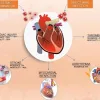Can genetics play a role in heart disease?
Have you ever wondered why some people seem to be more prone to heart disease than others? Is it purely a result of their lifestyle choices, or could genetics also play a role? In this article, we will explore the fascinating connection between genetics and heart disease and understand how our genes can influence our risk of developing this life-threatening condition.
- Understanding Heart Disease:
- Heart disease refers to a range of conditions that affect the heart, including coronary artery disease, heart rhythm problems, and heart valve issues.
- It is one of the leading causes of death worldwide and is often linked to lifestyle factors such as smoking, unhealthy diet, lack of physical activity, and obesity.
- However, research has shown that genetics can also contribute significantly to the development of heart disease.
- The Role of Genetics in Heart Disease:
- Our genes contain the instructions that determine our traits, including our susceptibility to certain diseases.
- Several genetic variations, or mutations, have been identified that can increase the risk of heart disease.
- One of the most well-known examples is a mutation in the gene called PCSK9. This mutation leads to higher levels of LDL cholesterol, also known as “bad” cholesterol, which is a major risk factor for heart disease.
- Other genetic variants can affect blood pressure regulation, inflammation levels, and the formation of blood clots, all of which can contribute to the development of heart disease.
- Familial Hypercholesterolemia:
- Familial hypercholesterolemia (FH) is a genetic condition characterized by very high levels of LDL cholesterol from birth.
- This condition significantly increases the risk of early-onset heart disease, even in individuals with an otherwise healthy lifestyle.
- People with FH inherit a mutated gene from one or both parents, which impairs the body’s ability to remove LDL cholesterol from the bloodstream.
- Genetic Testing for Heart Disease Risk:
- Genetic testing can help identify individuals who may have an increased genetic risk of developing heart disease.
- By analyzing specific genes associated with heart health, healthcare professionals can assess a person’s susceptibility to certain types of heart disease.
- This information can be valuable in developing personalized prevention and treatment strategies to mitigate the risk.
- Lifestyle Factors vs. Genetics:
- It is important to note that genetics alone do not determine whether a person will develop heart disease.
- Lifestyle factors such as diet, exercise, smoking, and stress management play a significant role in influencing the risk of heart disease.
- While we cannot change our genetic makeup, we can make positive lifestyle choices to reduce our overall risk.
- Fitpaa – Helping You Manage Your Heart Health:
- Fitpaa, a comprehensive health and fitness app, is designed to help individuals achieve their health and fitness goals while considering their unique genetic makeup.
- Fitpaa uses AI-driven technology to monitor and manage metabolism, optimizing overall health and reducing the risk of lifestyle diseases such as heart disease.
- With personalized Fitpaa Capsules, users can access a combination of medical therapy, exercise therapy, nutrition therapy, and cognitive behavior therapy to strengthen their bodies and achieve their health goals.
- Fitpaa’s real-time guidance technology ensures that individuals stay motivated and on track towards their goal, with a focus on habit-building and timely nudging.
- The Fitpaa app provides a range of tools, including a virtual workout trainer, diet tracker, and progress tracking, to make following the personalized health plan easier and more effective.
- Fitpaa’s team of fitness planners, nutritionists, trainers, and doctors regularly review progress and make adjustments to the Fitpaa Capsule to ensure optimal results.
In conclusion, genetics can indeed play a role in heart disease. Certain genetic variations can increase an individual’s susceptibility to heart disease by affecting cholesterol levels, blood pressure regulation, inflammation, and blood clotting. While genetics are a factor, lifestyle choices such as diet, exercise, and stress management also significantly influence heart disease risk. Fitpaa, with its personalized approach and holistic health management, can help individuals take charge of their heart health and achieve their fitness goals. Download the Fitpaa app today and embark on your journey to a healthier heart and a happier life.









